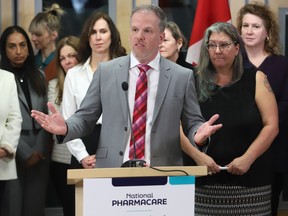Opinion: The first phase of proposed national legislation on pharmaceutical care does not include drugs for mental illness. Will Canadians living with mental illness continue to be marginalized in future phases?

Article content
In Canada, a country celebrated for its fair and universal healthcare system, there is today a significant disparity around the accessibility of medications for mental illness. This inequity not only highlights a critical gap in our healthcare model, but also highlights the need for a better mental health approach across all pan-Canadian initiatives, including future national universal pharmaceutical care.
Advertisement 2
Article content
One in five Canadians suffers from mental illness each year. From debilitating anxiety disorders to life-threatening depression, the burden of mental illness weighs heavily on people, with a tsunami of effects on families, workplaces and the healthcare system. When the needs of people living with mental illness are overlooked or minimized, a cycle of suffering and economic loss is perpetuated, as untreated mental illness results in increased healthcare costs and decreased productivity.
Article content
Despite the prevalence and serious impact that mental illness can have on people’s lives, access to necessary medications remains a significant challenge for many. This barrier is largely due to variations in drug coverage between provincial health authorities and between those with and without private coverage, creating a patchwork of access that leaves many Canadians without the essential treatments they need. Inconsistency in medication coverage exacerbates the challenges faced by those living with mental illness, contributing to prolonged suffering and, in many cases, impeding recovery.
Article content
Advertisement 3
Article content
We are deeply concerned about unequal access to medications for mental illness, as seen in the Mood Disorders Society of Canada report. broken system: How public drug coverage is failing Canadians with mental illness. This report examined Canada’s public reimbursement review process for medications to treat mental illnesses that were approved by Health Canada between 2012 and 2022. It revealed substantial delays, a significantly higher rate of negative reimbursement recommendations for medications that treat mental illnesses compared with other diseases, and an inequality of publicly funded medications in Canada’s most populous provinces.
In February, Health Minister Mark Holland said, “Each and every Canadian should have access to the prescription medications they need.”
The first phase of proposed national legislation on universal pharmaceutical care includes universal access to contraceptives and diabetes medications. Will the one in five Canadians currently living with a mental illness continue to be marginalized and deprioritized in future phases? Mental health care and access to medications must be prioritized to address the current mental health care crisis in Canada.
Advertisement 4
Article content
Psychiatrists are committed to patient well-being and we see firsthand the benefits of improving access to medications that treat mental illness. Enabling access recognizes that mental health is an integral part of overall health, breaking the stigma that has long prevented people from seeking and receiving help, thus fostering a healthier population and, by extension, a stronger society.
From an economic perspective, investing in mental health care, including medication coverage, produces high returns by reducing hospitalizations, emergency room visits, and the need for more intensive and costly interventions in the future.
As Canada moves toward implementing a national universal pharmaceutical care strategy, it is vital that the needs of people with mental illness are placed at the forefront of policy discussions. It is time for Canadian policymakers to prioritize the mental health of their citizens, recognizing the profound impact such a commitment can have on the lives of millions. The path to a more inclusive and equitable health care system is clear; It is our collective responsibility to take this path.
Advertisement 5
Article content
Dr. Diane McIntosh is a community psychiatrist and clinical assistant professor at the University of British Columbia. Dr. Pierre Blier, MD, is a professor in the Department of Psychiatry and Cellular/Molecular Medicine at the University of Ottawa.
Recommended by Editorial
Bookmark our website and support our journalism: Don’t miss the news you need to know – add VancouverSun.com and LaProvincia.com to your favorites and subscribe to our newsletters here.
You can also support our journalism by becoming a digital subscriber: for just $14 a month, you can get unlimited access to The Vancouver Sun, The Province, National Post and 13 other Canadian news sites. Support us by subscribing today: The Vancouver Sun | The province.
Article content


![NORTH VANCOUVER, BC., February 13, 2024 - The Carlile Youth Co-occurring Disorders Center set to close due to staff shortages, in North Vancouver, BC, on February 13, 2024. (NICK PROCAYLO/POSTMEDIA) 10103832A [PNG Merlin Archive]](https://smartcdn.gprod.postmedia.digital/theprovince/wp-content/uploads/2024/02/png0213nhospital-01-1.jpg?h=96&strip=all&quality=80&sig=cdySLyJpvVZ9lkowBdXyFw)